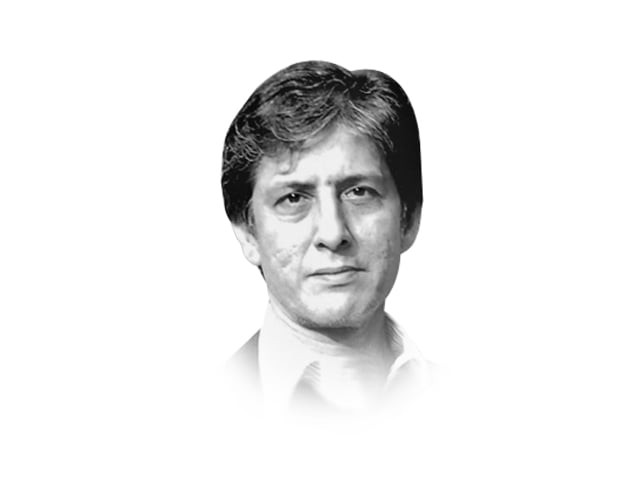In the national interest
A binary has been created: The civilians distrust the military; the military distrusts the civilians. Who is to blame?

There’s a laundry list of items in there but here’s the operative part: “Any effort to create divisions between [sic] important institutions of the Country [sic] is not in our national interest. The participants agreed that all of us should take cognisance of this unfortunate trend and put an end to it.”
When we want to do someone in, we national-interest him. By now, this unholy alliance of an adjective qualifying a noun should have made a place for itself as a verb in the OED. Perhaps it would by the time of the 140th corps commanders’ conference. In any case, our historical variation on Shelley’s maudlin “If Winter comes, can Spring be far behind” has always been “If National Interest comes, can Army be far behind”.
But lest anyone think I am being facetious. This is serious affair, ladies and gentlemen. There should be no doubt that Pakistan faces today some of the toughest challenges in its history. Never before was it more important for us to stand together because if we fall, we will fall together, those in uniform as much as those out of it. And yet, it cannot be gainsaid that at this precise moment when we need to close ranks we stand divided as never before.
A binary has been created: The civil and the military. The civilians distrust the military; the military distrusts the civilians. The positions on both sides of the divide are entrenched and deterministic; neither is prepared to appreciate the subtleties that inform the complex equation called Pakistan. Who is to blame?
Primarily the military. Its thinking that Pakistan is in danger is correct; its assessment that those who are pressing for fundamental changes to counter those dangers are a threat is, however, deeply flawed. Sure, it is cornered; it is getting frustrated, deeply so, and it would want nothing more than to get out of the bind it has got itself in. But for it to think that it can do so through an institutional response that serves, yet again, to deepen the very divide that is the biggest threat to the country is to redefine the concepts of bounded rationality and systematic stupidity.
There can be no putting an end to this by addressing the nation as if the army is conducting a darbar. And if the brass seriously thinks they can do that and everyone will fall in line, then they are adding to the threat rather than addressing it. The only way the military can attend to the current threat is by understanding clearly that they have to submit to the state and the people, not the other way round, that Pakistan is to be a state with an army.
Little does the army know that in another twist of irony its press release synced with the opening in Karachi of Pakistan’s first social media conference. While its media managers try to deal with what is emerging in the mainstream press, newspapers and tv channels, there is another kind of media evolving, taking shape and influencing the narrative. It is in an unregulated space and lack of regulation, for the most part, is built into this rough beast. For the most part it is terra incognita for the military’s media managers and they have no strategy to deal with it. It is this space where another narrative is taking shape and its shapers are totally alienated from the military.
When General Kayani took over, the army’s stock had plummeted even in the Punjab. In less than a year he turned it around. How? Simple. By being honest and forthright. The first time I interacted with him, he was DG-ISI. I noted after that meeting that he spoke little, listened carefully and asked questions that went straight to the heart of the problem. I was impressed. He evinced the same qualities in multiple interactions as army chief. And yet, he has got the baseline wrong and by doing that squandered the dividends of his own hard work.
The baseline is simple: The people of Pakistan are not opposed to the army; if they were, the army would not have got the support it did for its operations. But they are opposed to any institution that remains unaccountable. The army has to submit to them, not dictate to them from atop Mount GHQ, and definitely not national-interest them because nothing gets their goat as this does. Stoop and you will conquer them. Equally, the civilian side has to understand that while remaining steadfast to our demand for both glasnost and perestroika, we have to appreciate the challenges the military faces. If they go down, we will too. Criticise them we must but let that be constructive.
Published in The Express Tribune, June 12th, 2011.















COMMENTS
Comments are moderated and generally will be posted if they are on-topic and not abusive.
For more information, please see our Comments FAQ